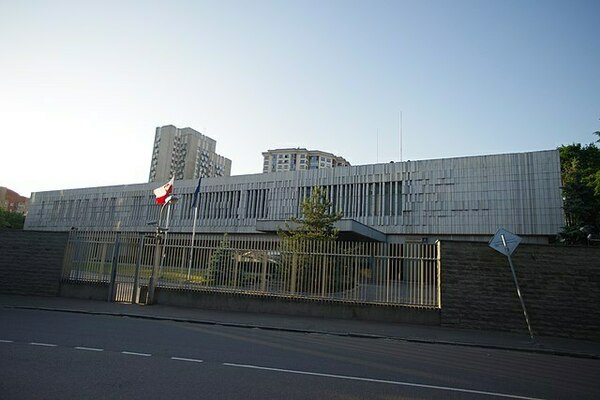In a 1926 dispatch to Polish embassies, foreign minister Aleksander Skrzyński noted, “The greatest issue for not only European peace but its entire future is shielding it from shockwaves.” The relevance of this warning rings true today. New shockwaves are pushing Europe closer to the tipping point of war than at any time in recent years. Amid the ongoing foreign policy debates dedicated to the current Russia-Ukraine crisis, a fundamental question that is worth considering, but rarely explored, is where smaller Central and Eastern European states—such as Poland—stand. Their viewpoints, though rarely in the international conversation, are essential if one seeks to develop a more comprehensive understanding of the situation. In brief, Russia’s actions contradict the key pillars of Poland’s post-Cold War foreign policy: a firm commitment to the Euro-Atlantic community, its economic and military security, and the promotion of key international principles vital to challenging neo-imperialism in its neighborhood.
Like other states in the region, Poland is worried. In recent weeks, Russian president Vladimir Putin has escalated tensions on the border with Ukraine by putting in place some 130,000 combat-ready troops and equipment. He has also demanded that NATO withdraw its forces from Central and Eastern Europe and deny Ukraine accession to the alliance. These actions signal Putin’s desire to gain significant leverage over the West in Europe. Not coincidentally, these moves come at a time when the international community is facing a series of other pressing global issues: the COVID-19 pandemic is far from over, inflation is soaring, the U.S. is still recuperating from its chaotic withdrawal from Afghanistan, and the European Union struggles with internal dissention in the wake of Brexit.
The fall of the Soviet Union—which Putin has declared the greatest geopolitical catastrophe of the 20th century—has loomed over him for the past thirty years, and it would appear that he is intent on restoring Russian greatness by rebuilding its former empire. If this is the case, the core goal of this program would likely be to reunite Russians, Belarusians, and Ukrainians under a single state and thereby expand Moscow’s influence over Central Europe. Rhetorically, Putin plays on historic imperialist thought, providing a mythical basis for justifying future aggression, negating the idea that Ukrainians are a distinct nation and insisting, instead, that they are “one people” with Russians. The final result would be a Kremlin-controlled power structure with autocratic dependencies around Russia’s boundaries.
In light of these developments and speculations, smaller states that lie on the historic axis of Russian expansion in Central Europe have been concerned for quite some time. Such fears should come as no surprise, given what these former satellite states (Poland, Romania, Czechia, and Slovakia) or socialist republics (Lithuania, Latvia, Estonia, Belarus, and Ukraine) experienced while they were either under total Soviet control or ruled by Moscow loyalists in so-called “people’s republics.” Dissidents and political opponents were brutally eliminated, national sovereignty was essentially nonexistent, and free thought was persecuted—creating what Nobel laureate Czesław Miłosz termed the “captive mind”—all in the name of brotherhood with the USSR. This mindset persists within Russia’s leadership today: foreign minister Sergei Lavrov recently referred to these states as “orphans” of the old Warsaw Pact military alliance, revealing his desire for their homecoming to the fraternal Russian fold. Among these states, however, there is a consensus to never return to those times.

Despite Putin’s previous and potential aggression in Eastern Europe, Poland’s foreign policy positions remain largely unchanged for now. It seeks to ensure peaceful relations based on multilateral and bilateral cooperation in the European Union and other international fora (for example, the United Nations and the Organization for Security and Co-operation in Europe, or OSCE). Both within and outside its neighborhood, Poland has been an outspoken supporter of upholding international law, repeatedly denounced imperialism, and remained committed to the promotion of democratization. For its own security, it relies primarily on NATO as well as the close ties it has developed with the U.S. and other partners belonging to the transatlantic system (for example, Canada and Great Britain).
Following the Cold War, Poland completely pivoted out of the Soviet sphere of influence and successfully reintegrated with the West. However, Poland’s geopolitical position—lying on a distinct West-East axis in close proximity to Russia—continues to influence its foreign policy. It acts as a bridge for partners like Belarus and Ukraine to Western integration and development. Simply put, Poland plays the role of Western ambassador in the East and Eastern ambassador in the West.
Furthermore, Poland’s experience during World War II explains the importance it assigns to respecting legal boundaries. Like other countries in Central Europe, it is heavily invested in the principle that states must refrain from using force or the threat thereof as a means of infringing on others’ territorial integrity or political independence. For Poland, Russia’s territorial occupations in eastern Ukraine and Crimea, illicit acts of interference in the internal affairs of a sovereign state, threaten this principle and carry home the message that, in the end, idealistic principles might offer little protection.
Two historical slogans capture the essence of Polish foreign policy today. First, “Free with the free, equal with the equal,” which was used to rally Poles, Lithuanians, and Ukrainians in the past, captures the idealistic notion of universal solidarity between nations. Second, “Nothing about us without us,” which once adorned the 19th-century banners of Poles fighting their Russian, Prussian, and Austrian partitioners, has recently found broader resonance in the political vocabulary of the Biden administration toward its partners in Central and Eastern Europe. These two principles underlie a series of international agreements—to which the USSR was a signatory—that Poland and its Central East European partners see as the magna carta of their sovereignty: the UN Charter, the Helsinki Final Act, and the Paris Charter for a New Europe.
As European stability, security, and prosperity are challenged by another crisis apparently caused by Putin’s imperialist revanchism, Poland continues to adhere to a foreign policy rooted in respecting international law, challenging imperialism, promoting democracy, and standing in solidarity with those nations threatened by Putin. It hopes to see the experiences of post-Cold War Europe, a region characterized by the rejection of traditional great power logic, continue and potentially even spread further. Poland’s foreign policy continues to hinge—as it has in previous decades—on multilateral efforts to uphold the primacy of international law in preventing shockwaves from rendering Europe “divided, desperate, and at war.” Time will tell how successful this approach will be. The outcome of the Ukraine crisis will likely inform its fate.
Further recommended reading on the subject
- Ryszard Zieba, Poland’s Foreign and Security Policy: Problems with Compatibility in the Changing International Order (Cham: Springer International Publishing, 2020).
- Ryszard Zieba, The Euro-Atlantic Security System in the 21st Century (Cham: Springer International Publishing, 2018).
- John Connelly, From People into Nations: A History of Eastern Europe (Princeton: Princeton University Press, 2020).
About the author

Dr. Paweł Markiewicz is a historian and international security analyst at the Polish Institute of International Affairs (PISM) in Warsaw. He specializes in topics concerning Poland’s transatlantic relations as well as U.S. and Canadian foreign-domestic policy. Markiewicz is the author of Unlikely Allies: Nazi German and Ukrainian Nationalist Collaboration in the General Government during World War II (Purdue University Press, 2021).
Image credit: ©PISM
Originally published by at eitw.nd.edu on February 22, 2022. EITW is a platform for scholars of Europe to present their ideas in a form that helps bridge the gap between the academy and the general public.